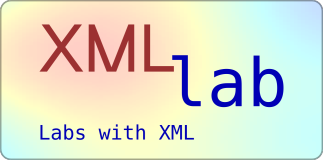


 |
 |


XMLlab is an XML-based simulation authoring environment. The proposed description language allows to describe mathematical objects such as systems of ordinary differential equations, systems of non-linear equations, partial differential equations in two dimensions, or simple curves and surfaces. It also allows to describe the parameters on which these objects depend. This language is independent of the software and allows to ensure a relative perennity of authors work, as well as collaborative work and content reuse.
The simulation is written in XML, according to the DTD file, then transformed into a Scilab-executable file. Scilab is a Matlab-like, free scientific software, developped by Scilab Enterprises and contributors (Scilab website).
XMLlab is shipped with the Web Server Module (Linux version only), which allows to make Scilab programs available from any browser, without needing any Scilab or XMLlab installation on the client side : proceed to the "Examples" tab and follow the link to the XMLlab WebServer.
 XMLlab 1.7.6 is available
XMLlab 1.7.6 is available
This new version of XMLlab has been tailored in order to work with the lastest stable version of Scilab (5.4.1): for example, the XMLlab WebServer feature (Linux only) now works regardless of graphics hardware (offscreen rendering is used).
XMLlab is available under the form of an ATOMS package, directly from within Scilab : to install XMLlab you just have to use the ATOMS modules manager in the Scilab command window. However, since there can be some delay until news versions are packaged by the Scilab Team, you can also download the package in the Download and make an offline install (see the install instructions).
Commands available since version 1.6 : pack file.xml creates a compressed archive file.xmllab containing the xml file as well as the resources used by the simulation (images, scripts or any resource). See e.g. in the folder examples/packed. These .xmllab files can be run like uncompressed simulations, and on every platform (Windows and Linux) you just have to double-click their icon to launch the simulation. This binding of the .xmllab extension can also be used in web pages (see the Examples tab) or pdf files.
Examples have been translated in Spanish.
Proceed to the "Examples" section if your native language is spanish !
XMLlab provides many interesting features (e.g. curve selection at runtime, use of parameter values in the textual elements of graphical output, e.g. in titles and labels, etc.).
The webserver allows to save and load sessions from the server, and allows to send to the server simulation files present on the client machine and execute it on the server. This feature is alreay available in the XMLlab site in the Examples section.
Scilab Contribution
XMLlab is a partner external module of Scilab
Papers and documentation
You can have a more precise idea of what is XMLlab and the dtd it uses by looking at the paper in the "Documentation" tab. Then, the Getting started guide will help you to build your first simulation. Finally, the Reference manual will allow you to go further and enjoy all the possibilities of XMLlab.
XMLlab is developed by Stephane Mottelet and Andre Pauss (currently both with the University of Compiegne).
Please contact  to send questions or bug reports.
to send questions or bug reports.
XMLlab is copyright (C) 2001-2009 by S.Mottelet and A. Pauss and is distributed under the terms of the GNU General Public License (GPL).
In short, this means that everyone is free to use XMLlab and to redistribute it on a free basis. XMLlab is not in the public domain; it is copyrighted and there are restrictions on its distribution (see the file LICENSE). For example, you cannot integrate this version of XMLlab (in full or in parts) in any closed-source software you plan to distribute (commercially or not).
If you want to integrate XMLlab into a closed-source software, or want to sell a modified closed-source version of XMLlab, please contact us in person. You can purchase a version of XMLlab under a different license, with "no strings attached" (for example allowing you to take parts of XMLlab and integrate them into your own proprietary code).
Also, let us know if you want us to put you on a list to receive email whenever a new version of XMLlab is available. This is not a public list; you won't get email from anyone but us, and you won't get it often. No need to fear a full mailbox. If you use a simulation generated by XMLlab in a publication, please include an acknowledgment as well..